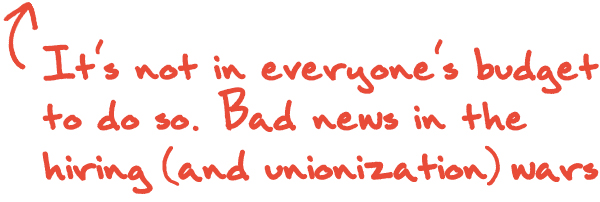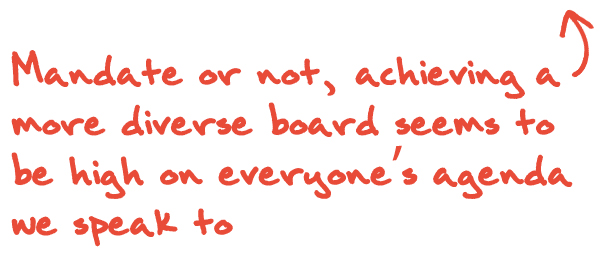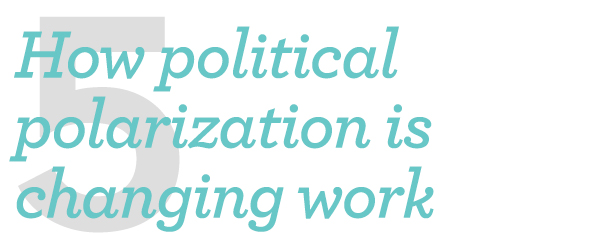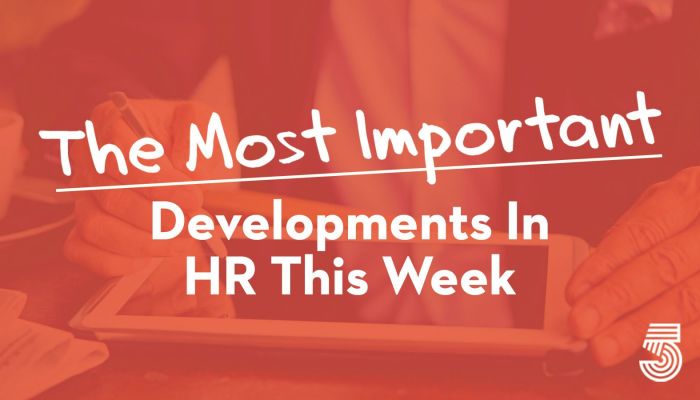The M.I.D., as we call it, is curated by our editorial team from more than 50 news sources. Like a lot of good ideas, this started as something I wanted for myself. If I can’t read everything, I at least want to stay abreast of the most important developments.
This week in HR, upskilling in blue collar fields replaced degrees, unionization swept across America, a California diversity mandate worked … and was repealed, employees expected bigger raises due to inflation, and politics at work was a problem.


As the labor market reorders, more Americans are making the leap from blue-collar jobs and hourly work to “new collar” roles that often involve tech skills and come with better pay and schedules. More than a tenth of Americans in low-paying roles in warehouses, manufacturing, hospitality, and other hourly positions made such a switch during the past two years, according to new research from Oliver Wyman, a management consulting firm that surveyed 80,000 workers world-wide between August 2020 and March 2022. Many of the new jobs are in software and information technology, as well as tech-related roles in logistics, finance, and healthcare. New data from the Current Population Survey and LinkedIn also suggest the pandemic has helped catapult more workers into more upwardly mobile careers. From the Oscar Wyman full report: “Companies need to continuously reassess their strategies to keep current with these consumers and employees or risk falling behind. People have changed and are demanding action. Now business must too.” WSJ


Rian Wathen is in the business of helping companies avoid unionization. He’s getting plenty of calls lately. Petitions to form a labor union shot up 57% in the last six months, according to the National Labor Relations Board, with campaigns at Amazon, Starbucks, John Deere, Kellogg’s, and REI among the highest-profile. Consultants like Wathen are urging companies to speak to their employees about concerns such as bad bosses and lack of pay raises and act quickly to address them. While workers are often after higher pay and better benefits when they decide to form a union, other requests may include better work-life balance and more input on company decisions. At Amazon, employees were critical of high productivity quotas and constant surveillance by technology they said made them feel like cogs in a machine. “People will work for money, but they will die for respect,” said Jason Greer, president of Greer Consulting. “You might have employees saying they want a union, but what they are really saying is I want executives to recognize I’m a human being and not someone who shows up to make you all richer.” Forbes


Adding more pressure on employers to raise wages, consumer prices rose 8.5% year over year in March, the highest inflation rate since 1981, the U.S. Bureau of Labor Statistics (BLS) reported on April 12. The monthly increase from February to March was 1.2%. The latest figures show that inflation continues to escalate. The consumer price index (CPI) had risen 7.9% in February from a year earlier and was up 7.5% in January year over year. Higher inflation means the buying power of workers’ take-home pay is shrinking. Real (inflation-adjusted) average hourly earnings fell 2.7%, seasonally adjusted, from March 2021 to March 2022, the BLS separately reported on April 12. Most U.S. organizations are planning a payroll budget increase of 4% or more this year, and a plurality of organizations are growing their salary merit-increase budgets by 5% or more, new research shows. SHRM


California has become the focus of a battle over how companies should address the lack of diversity on their boards: Should they actively seek out directors who aren’t White males, or should they simply seek to treat all candidates equally? A Superior Court judge has ruled in favor of the latter approach, declaring unconstitutional a law requiring publicly traded companies based in the state to add as many as three board members from under-represented groups. This is unfortunate, because the law was actually working. Nobody in the California case challenged the idea that diversity is desirable. The key question in the legal challenge — filed by the conservative group Judicial Watch — was whether the state constitution allowed the legislature to advantage some groups over others in its efforts to address the problem. During its brief time in force, beginning on Sept 30, 2020, the legislation demonstrated just how effective a mandate can be in reversing long-entrenched discrimination. As of July 2021, the share of California companies with at least one Black or one Latino director stood at 30% and 17%, respectively — up from 16% and 13% a year earlier, according to a Latino Corporate Directors Association analysis of Equilar data. As of September 2021, nearly a third of boards had at least one woman, up from less than a quarter a year earlier, according to Equilar. Bloomberg


The latest HBR podcast is a conversation with Harvard’s Julia Minson and Francesca Gino about how to stop colleagues’ differences of opinion from devolving into conflict. Politics has traditionally been a taboo topic to discuss on the job. But as people get more vocal about their views — on everything from from climate change to racial justice, elections to invasions — it’s increasingly hard to keep debate out of the workplace. And that can lead to conflicts between colleagues. Julia Minson of the Harvard Kennedy School of Government and Francesca Gino of Harvard Business School have studied how political polarization is affecting organizations and have advice on handling the challenges it presents. Together, they wrote the HBR article “Managing A Polarized Workforce: How to Foster Debate and Promote Trust.” What happens when teammates adamantly disagree on big social, political, and economic issues though? Or there’s a huge divide between workers in management or an individual boss and their employee? HBR IdeaCast










